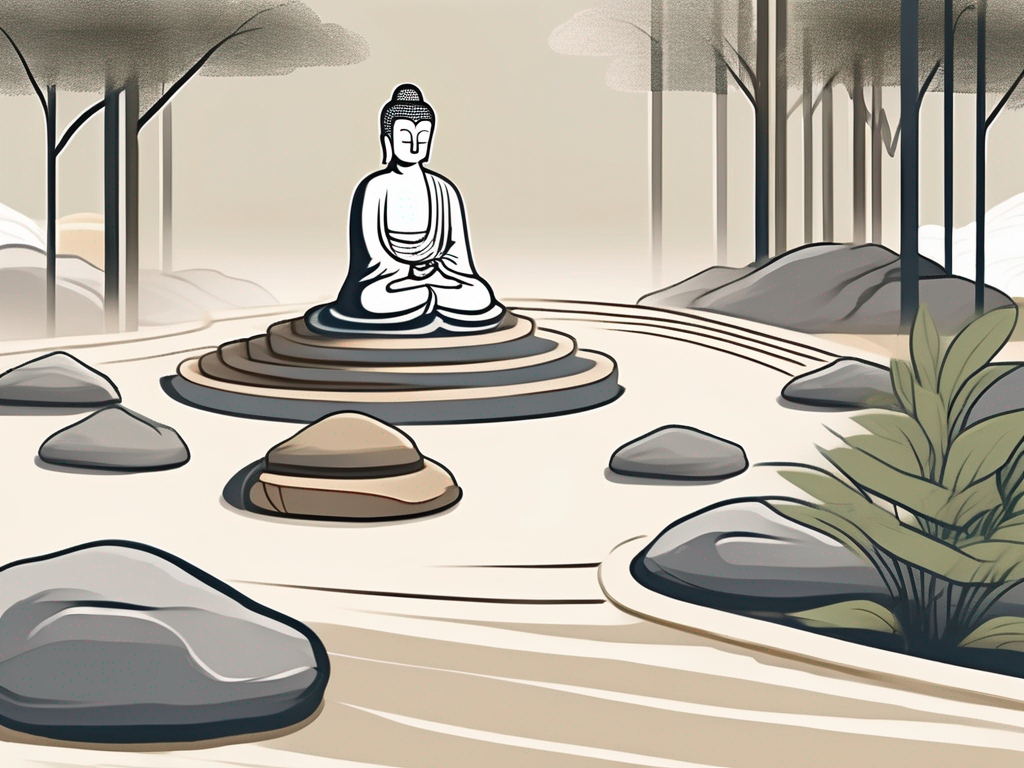In today’s fast-paced world, it’s often challenging to find a moment of peace amidst the chaos. That’s where Zen meditation comes in. This ancient practice has been around for centuries, offering individuals a pathway to inner peace and mental clarity. In this article, we will explore the origins and philosophy of Zen, the benefits of Zen meditation, how to prepare for a session, the meditation process itself, and how to overcome challenges along the way.
Understanding Zen Meditation
The Origins and Philosophy of Zen
Zen meditation traces its roots back to ancient India, where it initially developed as a means to attain enlightenment. It was during the time of the historical Buddha, Siddhartha Gautama, that meditation practices began to emerge as a way to quiet the mind and cultivate a deeper understanding of the self and the nature of existence. As Buddhism spread to different parts of Asia, Zen meditation found its way to China and Japan, where it flourished and gained immense popularity.
In China, Zen, known as Chan, became a prominent school of Buddhism. It was greatly influenced by Taoism, a philosophical and religious tradition that emphasizes living in harmony with the Tao, the fundamental force that flows through all things. Zen, like Taoism, emphasizes a direct experience of reality, without the need for complex theories or intellectualizations. It seeks to transcend the limitations of language and concepts, pointing directly to the truth that lies beyond words.
When Zen reached Japan, it merged with the indigenous culture and took on its unique characteristics. Zen became deeply ingrained in Japanese society, influencing not only religious practices but also art, literature, and even tea ceremonies. The simplicity and directness of Zen resonated with the Japanese people, who embraced it as a way of life.
At the heart of Zen philosophy is the concept of “satori,” which refers to a sudden and profound understanding of the nature of reality. This understanding is not something that can be achieved through intellectual analysis or logical reasoning. Instead, it is a direct experience that arises when the mind is quiet and free from conceptual thinking. Zen meditation serves as a tool to help practitioners cultivate the conditions necessary for satori to occur.
Key Principles of Zen Meditation
Central to Zen meditation are the principles of mindfulness, simplicity, and non-attachment. Mindfulness involves being fully present and aware of each moment as it unfolds. It is about bringing one’s attention to the present moment, without judgment or attachment to thoughts, emotions, or external circumstances. Through mindfulness, practitioners learn to observe their thoughts and feelings without getting caught up in them, cultivating a sense of inner calm and clarity.
Simplicity is another fundamental principle of Zen meditation. In a world filled with distractions and complexities, Zen encourages individuals to let go of unnecessary attachments and focus on the essence of the practice. This simplicity extends to all aspects of life, from the way one dresses and eats to the way one interacts with others. By simplifying one’s life, practitioners create space for deeper reflection and self-discovery.
Non-attachment is a key teaching in Zen. It teaches us to detach ourselves from the constant stream of thoughts and emotions that arise in the mind. Rather than getting caught up in the stories and narratives created by the mind, practitioners learn to observe these thoughts and emotions without judgment or attachment. By cultivating non-attachment, one can develop a sense of inner freedom and peace, no longer being controlled by the ups and downs of life.
Through the practice of Zen meditation, individuals embark on a journey of self-discovery and transformation. It is a path that requires dedication, patience, and perseverance. As one delves deeper into the practice, the layers of conditioning and habitual patterns begin to unravel, revealing a deeper truth that lies within. Zen meditation is not just a technique or a set of instructions; it is a way of life that can lead to profound insights and a greater sense of connection with oneself and the world.
The Benefits of Zen Meditation
Enhancing Mental Clarity through Zen
In our busy lives, our minds often become cluttered with thoughts, worries, and distractions. Zen meditation offers a way to declutter and sharpen our mental clarity. By practicing Zen regularly, we train our minds to quieten the noise and find clarity amidst the chaos. This enhanced mental clarity can lead to improved focus, decision-making, and overall cognitive function.
When we sit in meditation, we create a space for our thoughts to settle and our minds to become still. As we focus on our breath or a specific point of concentration, we gradually let go of the constant stream of thoughts that usually occupy our minds. This process allows us to experience a sense of spaciousness and clarity that is often lacking in our daily lives.
Through the practice of Zen meditation, we develop the ability to observe our thoughts without getting caught up in them. We become more aware of the patterns and tendencies of our minds, which allows us to make conscious choices about how we respond to different situations. This heightened awareness and mental clarity can have a profound impact on our daily lives, enabling us to navigate challenges with greater ease and make decisions that align with our values and goals.
Achieving Inner Peace with Zen Meditation
Inner peace is something we all strive for, but often find elusive. Zen meditation provides a pathway to achieving and cultivating inner peace. Through the practice, we learn to detach ourselves from external circumstances and find tranquility within. This inner peace can lead to reduced stress and anxiety, improved emotional well-being, and a greater sense of contentment.
When we sit in meditation, we create a space for self-reflection and self-discovery. We become more attuned to our inner world and develop a deeper understanding of ourselves. This process allows us to let go of attachments and expectations, freeing us from the constant striving and dissatisfaction that often characterizes our lives.
As we cultivate inner peace through Zen meditation, we also develop a greater sense of compassion and empathy towards ourselves and others. We begin to see the interconnectedness of all beings and recognize that our well-being is intricately linked to the well-being of others. This shift in perspective can lead to more harmonious relationships, both with ourselves and with the world around us.
In conclusion, Zen meditation offers numerous benefits for our mental and emotional well-being. By enhancing our mental clarity and achieving inner peace, we can experience a greater sense of fulfillment and live more authentically. Whether you are a beginner or an experienced meditator, incorporating Zen meditation into your daily routine can bring about profound positive changes in your life.
Preparing for Zen Meditation
Zen meditation, also known as Zazen, is a practice that allows individuals to cultivate mindfulness and inner peace. Before embarking on a meditation session, it is important to prepare both the mind and the physical environment. By creating a conducive atmosphere, you can enhance your meditation experience and deepen your connection with the present moment.
Creating a Conducive Environment
One of the first steps in preparing for Zen meditation is finding a quiet space where you can immerse yourself in stillness. This space should be free from distractions and interruptions, allowing you to fully focus on your practice. Consider choosing a room that is away from the noise of everyday life, or if that is not possible, use earplugs or noise-cancelling headphones to block out external sounds.
Once you have found your ideal meditation spot, it is important to eliminate any potential distractions. Turn off your phone or put it on silent mode to avoid interruptions. If you live with others, let them know that you will be meditating and ask for their cooperation in maintaining a peaceful environment.
Creating a serene atmosphere can greatly enhance the quality of your meditation practice. Dimming the lights or using soft lighting can help create a calming ambiance. Some practitioners find that adding elements like candles or incense can further enhance the meditative atmosphere, creating a sensory experience that promotes relaxation and focus.
Essential Meditation Tools
While Zen meditation does not require any fancy or expensive equipment, there are a few essential tools that can support your practice and make it more comfortable.
A meditation cushion, also known as a zafu, is a popular choice for practitioners who prefer a seated posture. These cushions provide comfortable support for the hips and lower back, allowing for a more relaxed and stable meditation posture. They come in various shapes and sizes, so you can choose one that suits your body type and preferences.
In addition to a meditation cushion, a meditation shawl or blanket can be useful, especially during longer meditation sessions. These blankets provide warmth and comfort, helping you stay cozy and relaxed throughout your practice.
To ensure that you stay within your desired meditation time, consider using a timer or a meditation app. These tools can help you track your progress and gently alert you when your session is complete. By using a timer, you can let go of the need to constantly check the clock, allowing yourself to fully immerse in the present moment.
Remember, while these tools can enhance your meditation experience, they are not necessary for practicing Zen meditation. The most important aspect of meditation is your commitment to the practice and your willingness to cultivate mindfulness and inner peace.
The Zen Meditation Process
The practice of Zen meditation is a profound and transformative journey that can lead to inner peace and self-realization. It is a process that involves various elements, including posture, breathing techniques, and mindfulness. Let’s explore these aspects in more detail.
Posture and Breathing Techniques
One of the fundamental aspects of Zen meditation is maintaining a proper posture. By sitting on a cushion or chair with your back straight, you create a stable foundation for your practice. This alignment allows for the free flow of energy throughout your body, promoting a sense of groundedness and stability.
As you settle into your posture, it is essential to focus on your breath. Breathing techniques play a crucial role in Zen meditation, serving as an anchor for your attention. Take deep breaths, inhaling through your nose and exhaling through your mouth. Allow the breath to guide you into a state of relaxation and presence.
With each inhalation, imagine drawing in fresh energy, filling your body with vitality. As you exhale, release any tension or stress, letting go of any thoughts or distractions. The breath becomes a powerful tool to cultivate a calm and centered state of mind.
The Role of Mindfulness in Zen
Mindfulness is a key component of Zen meditation. It involves bringing your attention to the present moment, fully engaging with your experience without judgment or attachment. As you sit in stillness, become aware of any bodily sensations, sounds, or thoughts that arise.
Observe these sensations and thoughts as they come and go, without getting caught up in them. Instead of labeling them as good or bad, simply acknowledge their presence and let them pass. This practice of non-attachment allows you to cultivate a sense of equanimity and acceptance.
It is natural for the mind to wander during meditation. When you notice your thoughts drifting away, gently redirect your focus back to your breath. By repeatedly bringing your attention back to the present moment, you train your mind to become more attuned to the here and now.
With consistent practice, you may begin to notice a shift in your awareness. The mind becomes less entangled in the past or future, and a sense of calm and clarity arises. This state of mindfulness extends beyond the meditation cushion and permeates into your daily life, enhancing your ability to navigate challenges with grace and presence.
Remember, Zen meditation is not about achieving a specific outcome or goal. It is a continuous exploration of the present moment, a journey of self-discovery and awakening. Embrace each meditation session with an open heart and a curious mind, and let the transformative power of Zen unfold.
Overcoming Challenges in Zen Meditation
Dealing with Distractions
Distractions are bound to arise during meditation, especially in the beginning. Thoughts may pop up, noises may interrupt, or physical discomfort may arise. The key is to acknowledge these distractions without getting caught up in them. Observe them with detachment, letting them pass by like clouds in the sky. Redirect your attention back to your breath, returning to the present moment without judgment or frustration.
Managing Expectations and Frustrations
It’s natural to have expectations when starting Zen meditation, but it’s essential to manage them. Meditation is a practice that evolves over time, and progress may not be linear. Some days you may experience deep stillness and clarity, while other days your mind may feel busier and scattered. Embrace each session as it comes, without attaching to any particular outcome. Let go of self-judgment and allow yourself to be present with whatever arises.
Embarking on a journey of Zen meditation can be transformative. By dedicating time to stillness and inner reflection, you can tap into a wellspring of peace and clarity within. So, find a quiet space, prepare your meditation tools, and dive into the practice. With regular commitment, you’ll discover the many benefits that Zen meditation has to offer, bringing a sense of harmony and balance to your life.












